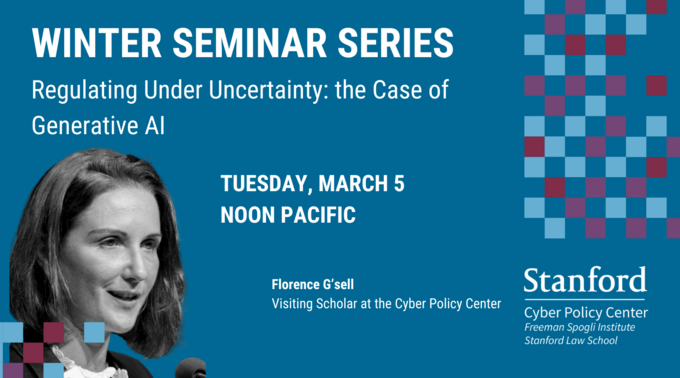
[INTERVIEW] Privacy and Electronic Surveillance in the US, with Marc Rotenberg
22 February 2024
[INTERVIEW] European Personal Data in the USA: a transatlantic legal saga, with Florence G’sell
19 April 2024The Cyber Policy Center hosted on March 5th a conference called Regulating Under Uncertainty: the Case of Generative AI with Florence G’sell Visiting Scholar at the Cyber Policy Center. The session was moderated by Nate Persily, co director of the Stanford Cyber Policy Center, and is part of the Winter Seminar Series, a series spanning January through March hosted at the Cyber Policy Center.
On 2 February 2024, the Council of EU Ministers reached a unanimous decision to approve the European Union’s Artificial Intelligence Act. This Regulation, expected to be ratified by the European Parliament without any changes, represents the first initiative to create a comprehensive regulatory environment for Artificial Intelligence that will have worldwide implications, due to the Act’s broad extraterritorial application. The AI Act includes specific provisions designed to regulate foundation models, and in particular generative AI models, which were adopted after intense debate.
This presentation explored the complexities and challenges associated with governing and regulating emerging technologies such as generative AI, using the drafting of the AI Act as a case study. It addressed the question of how to devise an effective regulatory framework and mitigate risks in the face of innovations whose potentials and associated risks are not fully understood. This analysis included a comparative assessment of the regulatory approaches adopted by the European Union and the United States, with the goal of evaluating the suitability and efficacy of these strategies.
About the Speaker

Florence G’sell is a professor of private law at the University of Lorraine and leads the Digital, Governance and Sovereignty Chair at Sciences Po. She is currently a visiting professor in the program on the Governance of Emerging Technologies, at the Cyber Policy Center.
Florence G’sell began her academic career working mainly on tort law, judicial systems and comparative law. For the past several years, she has been working on digital law and in particular on issues related to the regulation of online platforms, the way law can deal with new technologies (Blockchain, Metaverse), the notion of digital sovereignty and, more generally, digital policies in the EU and the US. She has edited and published several books on digital issues, including Le Big Data et le Droit (Dalloz, 2021) and Justice Numérique (Dalloz, 2022). Recently, she published “Les réseaux sociaux, entre encadrement et auto-régulation” (Sciences Po, Digital, Governance and Sovereignty Chair, 2021), “AI Judges” (in Larry A. Dimatteo, Cristina Poncibo, Michel Cannarsa (edit. ), The Cambridge Handbook of Artificial Intelligence, Global Perspectives on Law and Ethics, Cambridge University Press, 2022), and “The Digital Services Act: a General Assessment” (in Antje von Ungern-Sternberg (ed.), Content Regulation in the European Union – The Digital Services Act, Institute for Digital Law (IRDT), Trier April 2023). She has also co-authored the Council of Europe report entitled “The Impact of Blockchains for Human Rights, Democracy and the Rule of Law” (with Florian Martin-Bariteau, 2022).
Florence G’sell graduated from Sciences Po and is admitted to the Paris Bar. She obtained her PhD in private law from the University of Paris 1 Panthéon Sorbonne and holds the French “agrégation de droit privé et sciences criminelles”. She has been invited several times at the University of Chicago and, more recently, at Stanford University.

![[CONFERENCE] Regulating Under Uncertainty: the Case of Generative AI Slide](http://www.sciencespo.fr/public/chaire-numerique/wp-content/plugins/revslider/public/assets/assets/dummy.png)
